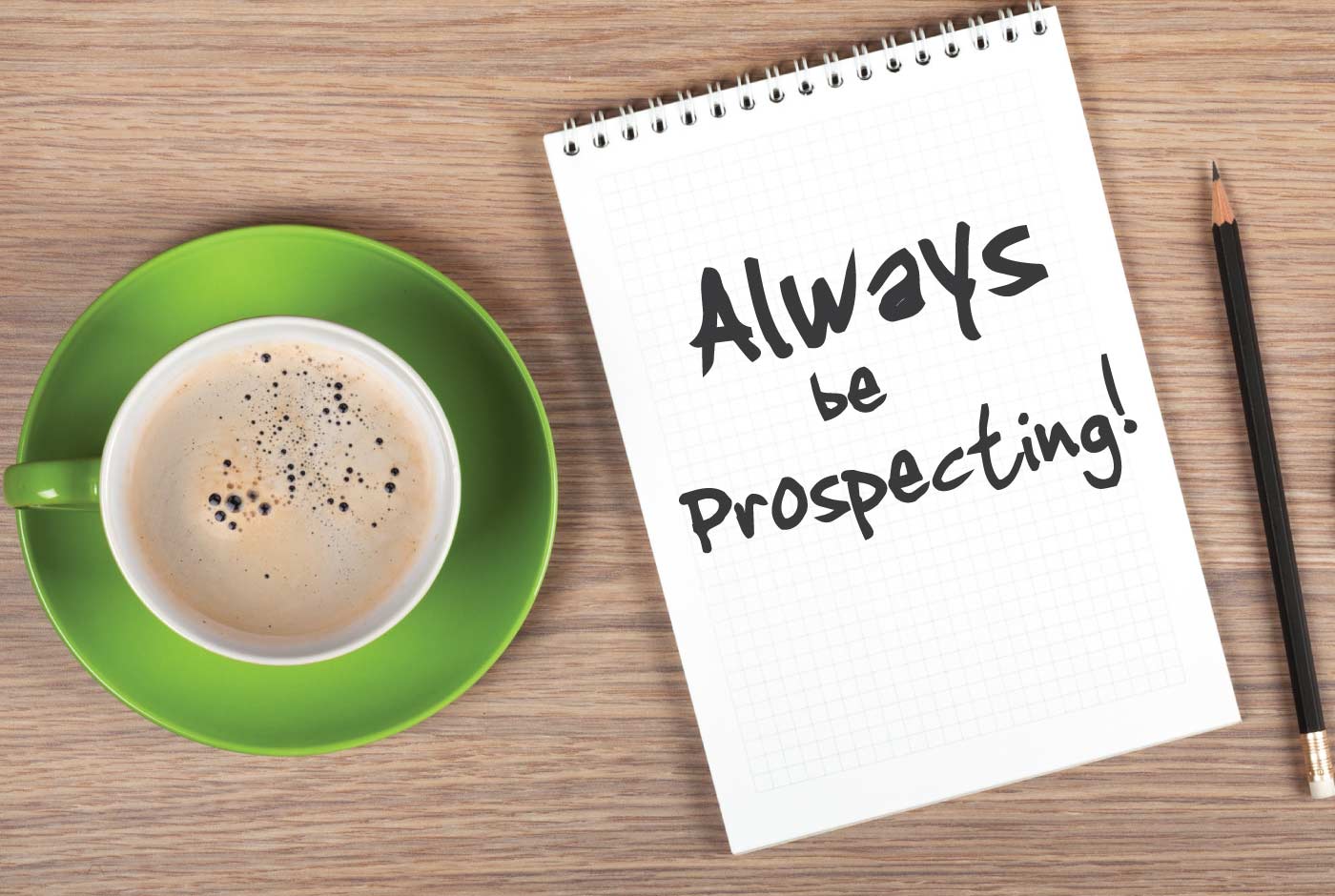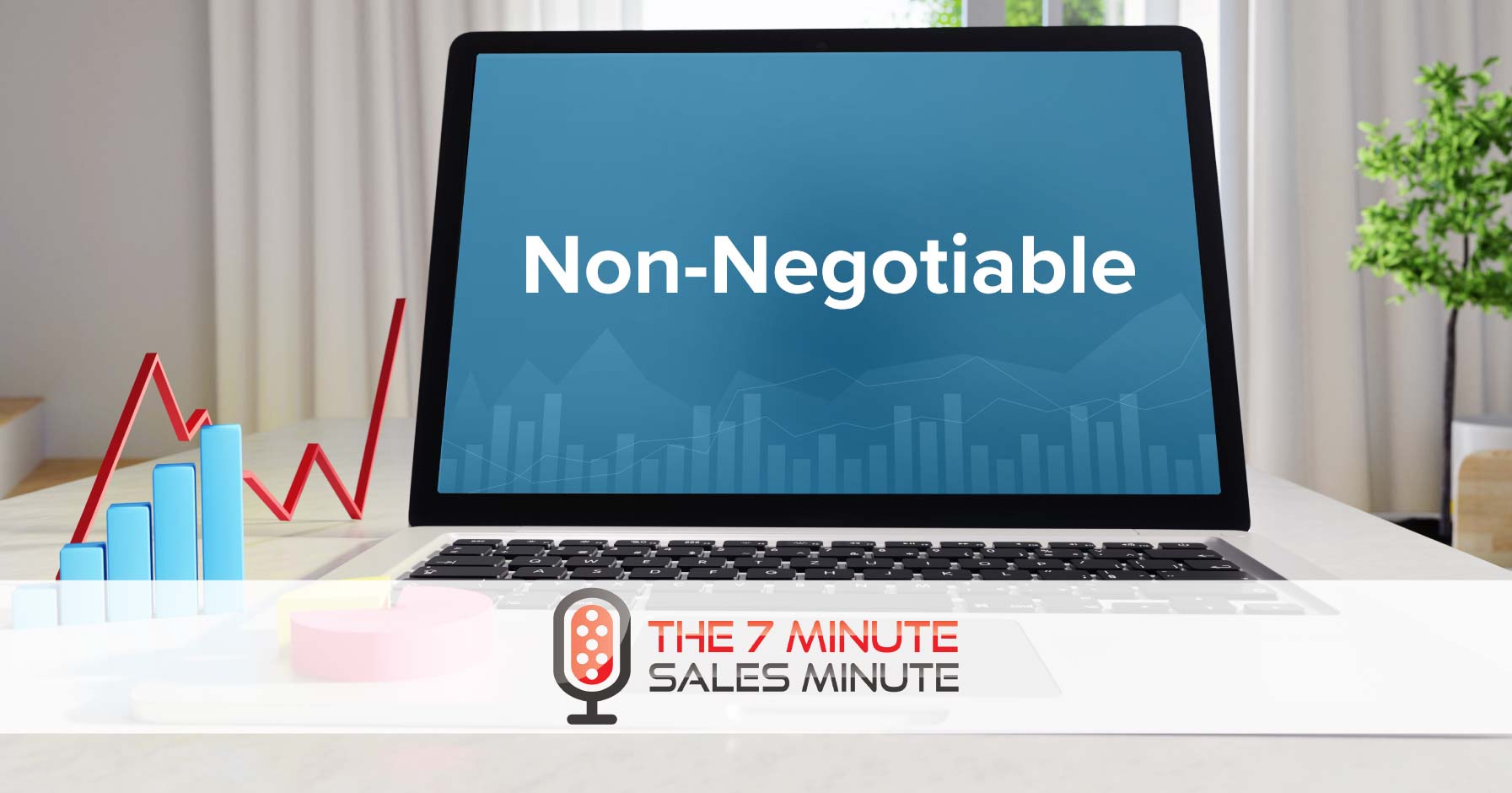
In this episode Jon and Scott tell us exactly when we should be prospecting.
Here’s a hint, it’s ALWAYS.
The fellas give you tips on where to find your business when it feels like there is no business to be had.
You can find Scott’s books on Amazon here Sell Smarter: Seven Simple Strategies for Sales Success.
You can find Jon’s book at The Think Big Movement: Grow your business big. Very Big!
Read the full transcript
Jon: Welcome back.
Scott: No doubt. Welcome back. I mean it’s been – literally – we’ve been gone for a while, folks.
Jon: We have. We have. Well, good things come to those who wait. We took a little hiatus. Let people catch up on all of our past four seasons and get through our e-book, which is the full transcript of everything. So, ready to rock and roll and do some more.
Scott: Yeah. Welcome to Season Five.
Jon: Yeah. Welcome, welcome. It’s been a fun ride so far. What are we going to talk about today?
Scott: We’re going to talk about prospecting.
Jon: All right. Good. Very important.
Scott: Yes.
Jon: How often do you think people should prospect?
Scott: That’s a very good question, Jon.
Jon: That is a good question.
Scott: And I think the answer to that is always. We should always be prospecting.
Jon: I agree. I like to basically say ABP.
Scott: ABP. I like it. Where’d you get that from? ABC, always to be closing, but ABP, always be prospecting. We should always be trying to find our next client.
Jon: That is right. I also use this. We’re not going to talk about right now. I like to say ABR. Always be recruiting when I’m talking to companies.
Scott: I like that.
Jon: But we’ll talk about that another time.
Scott: I use ABF sometimes. Always be Fish.
Jon: Well, I thought that’s what it meant. I thought it meant something different for a minute.
Scott: We’re PG-13 here, Jon.
Jon: Right. Exactly. So, let’s teach people or talk about people and evolve and get people a new perspective on what to prospect, how to prospect, and really take their game to the next level because as sales people, we all want to grow our pipelines. We want to grow our sales, and prospecting is, I would say, the number one thing that we as sales people should never ever, ever stop doing to it.
Scott: Right.
Jon: Yeah. So, what do we do? Let’s give them some quick tips.
Scott: Well, first and foremost, I think one of the biggest mines of resource we can get is our past clients, our past customers.
Jon: I agree. What about them?
Scott: Well, if we did a good job with them, which you know we did, we can call them and ask who else they know and get a referral.
Jon: Yeah. It’s interesting, and I think, sometimes, people are uncomfortable with that, and we talked about this on past podcasts. Maybe not asking for a “referral” but an introduction, but I just recently heard a study that behind every person that we know, specifically every client, in this case, there’s 250 people behind that person. So, if you just look at it from stat, from any statistic, I mean if you can get one of those 250 people, you go in with the idea and the intention that you’re going to get one of those 250.
Scott: I like that.
Jon: Yeah. So, and so then, when you get the introduction or the referral, then what do you do with it? I think that’s key. Let’s talk about that for a second. What do you do with that prospect?
Scott: Well, the first thing I always do, if someone gives me a referral, is I always ask them to warm that referral up for me a little bit.
Jon: Yeah. That’s a good idea.
Scott: Whether it might just be a text message that says, “Hey, Scott’s going to give you a call,” or an email or a phone call. Something letting them know that I’m going to be reaching out helps because if I call you and blatantly just say, “Hey, Jon. This is Scott. Bob told me to give you a call,” and you don’t know that Bob told … The first thing you’re doing is, “I’m going to kill Bob.” That’s the first you’re going to say, but number two, you’re going to be like, now, I’ve got to call Bob and find out if this guy really is good, or if he just saw me on Bob’s Facebook or whatever.
So, getting that soft introduction always helps.
Jon: Right, that’s well said. And then, I think when you then get that name, I think this is a piece that people miss because they will just pick up the phone. Like, “Hey, Fish. Thanks for the introduction,” and then I pick up the phone, and I call that person, and I set up a meeting. When really, I think an extra step needs to be infused into that, which is do research on that person.
I mean back in the day when we were in middle school and high school, if you had to do a report, you went to the encyclopedia, and you had a paragraph on something. Today, you can do research and find out so much information on everybody. LinkedIn, Facebook, all social media, their websites. So, do the research, so when you talk to that person, it’s more custom. There’s a value added component that you’re bringing to the table other than just, “Hey, you and I know Fish.”
Scott: I’m going to ask you just your piece of advice because this goes right into your wheelhouse. You give people business advice all the time. If I’m looking you up on LinkedIn, and you are a referral, should I be doing that anonymously or should I be doing it as myself because you know that person gets the alert.
Jon: Notification.
Scott: Mm-hmm (affirmative).
Jon: I don’t think it matters. I mean people who are referred to me, I see them looking up my websites or my LinkedIn, and I like it. I like people doing research on me, so when they come to me, I know that we can start the conversation at a different level after the rapport building. I believe in full transparency. So, when it comes to that, if you have to do something anonymously, and then you go to the meeting. You’re like, “Hey, I know this about you,” but you don’t know why or how, I think that sets the wrong tone.
Scott: It’s a little creepy.
Jon: It is creepy. So, definitely be custom, be value add when you get your hands on this gold, do the research. Take some time, and no bull*#&! of “well, I didn’t have time to do research.” That’s horse*#&!.
Scott: Right.
Jon: You said a comment right before we started this podcast, which I loved. Why don’t you … I’m going to say it, but you said it. Don’t let your clients be too busy. Don’t you be too busy. Don’t you be too busy. Do what’s needed to be done and important to show your value add. Otherwise, you’re a commodity.
Scott: Correct. So, what else? I think the other thing that we could do, aside from mining our past clients is mining past prospects that didn’t move forward with us.
Jon: Yeah. Perfect.
Scott: I’ve had a lot of clients over the years, and I hate this, and I always throw it back in their face, and I’m kind of a jerk for saying it, but someone’s like, “Well, you know, I’m going with such and such, but I’m going to keep you in mind if anyone else needs your business.” I’m always like, subconsciously, you’re telling me I’m not good enough for you, but I’m good enough to work with your friends, that kind of bull*#&!.
Jon: Right.
Scott: But, you have those people. I always write them down, and I go back to them once a quarter and just say, “Hey, remember you said, we didn’t move forward, but you said you’d send me some business. Let’s talk. Who can use my services?
Jon: I love that. And having the confidence and the conviction to do that without, not that you’d sound like a jerk, but in general, people, making sure that you do it with good intentions. Not you, but just everybody in general is important. I think, also, with those old prospects that you don’t end up getting the business from, to really, and I know we’ve talked about this in past podcasts too, but it’s been a while, to really have a marketing campaign and whether it’s constant contact or whatever technology you’re using, where you’re sending them evergreen-type reminders – custom-ish emails – so they don’t forget about you because they will forget about you.
Scott: Right, and along the same token or the opposite side of that coin, I guess, is these clients who didn’t move forward with us that kind of broke up with us. Another great pool of talent to call is the client who we couldn’t help because they didn’t qualify for our product or it was something that ultimately they couldn’t use. I can’t tell you how many times I get the sweet little old lady that I just treat with respect that I can’t help, but literally the next day, their daughter or son is calling me and looking for a mortgage. It happens literally at least once a quarter.
Jon: Nice. Good. Well done. I think another idea is, and I recently heard this on a podcast. Financial Advisors Success podcast, I think is the name of it, and they interviewed somebody who basically talked about one of the ways that they prospect is to go to museums and wherever and take pictures of the donor walls and then do a lot of research and send custom emails to those people, and their return rate was huge because of the research that they did. There was nothing standard. There was no template that they used. Everything was custom based on the value that they brought to each specific email and conversation or call.
Scott: That’s great. If someone’s willing to cut a check to donate, you know that they have the ability to do business in some way shape or form.
Jon: Yeah. I love that one.
Scott: So, going back to Always Be Prospecting. I want to tell a story. There was a guy that I worked with. Literally, in my company, he was the first person to cross the seven-figure threshold in what we did.
Jon: Oh, wow.
Scott: And what’s amazing is that this guy, I always said I could never do what he did, but I try to employ a little bit of it more and more in my life, is if he went to the grocery store, he had six or seven conversations from the time he walked in the door to the time he walked out about mortgages. Whether it was the person bagging his groceries, the person ringing him up, the person behind the counter getting him the sliced turkey, every single person he comes in contact with, he prospected.
Jon: I love it.
Scott: And when you think about it, yeah, he was a little annoying, but he was able to retire early, and now, he doesn’t have to annoy anybody but his wife.
Jon: And now, someone goes grocery shopping for him.
Scott: Exactly.
Jon: That’s great, but I bet that guy, I don’t know that guy, but I would bet he, it’s just in his DNA, and he probably still is doing it.
Scott: Yeah. For sure.
Jon: And he’s probably doing it just to get to know people and this, that, and the other and referring people to whomever and yeah.
Scott: Absolutely.
Jon: Yeah. I think that’s great. And that just is another thing, which I am horrible at this, which is always have business cards on you. If you’re going to be prospecting, always have business cards on you. I really need to take my own advice on that one because I never do. So, I think I maybe will put some in my car and like different backpacks that I use. But I am not … Yeah, but I think it’s important.
Scott: I actually just went through the exact same thing. I had to order business cards last week because one of my clients said, “Hey, send me some business cards,” and I said, “I don’t have any.”
Jon: Right. Right.
Scott: Whoops.
Jon: A lot of times, I find myself friending someone on Facebook or LinkedIn while I’m talking to them and then shooting them a message via text, but there’s something about the interaction still with a business card that is I think important.
Scott: Right.
Jon: Yeah. All right. So what else? I think we just fire-hosed some ideas as far as prospecting.
Scott: Yes.
Jon: I’ll say this in closing as far as prospecting goes. Based on your friend, you always should be prospecting. It’s so common that if our pipeline gets to a certain point, we stop prospecting, and we deal with the business at hand, and before we know it, that business at hand is done or closed or died, and then we have nothing left in our pipeline, and we have to rebuild. And there’s nothing worse than a rollercoaster world for a sales person, so you should always be prospecting. And this: I hear sometimes, “Well, I can’t prospect because I’m too busy right now. I can’t take care of the client.” So, if that’s the case, figure out how to balance your time to bring on the ideal clients that you A, want, or B, bring on clients and then refer them to people within your business, so you can at least get a referral fee.
Scott: Right, and well, going back to that guy that was always prospecting, prospecting the deli counter guy, he literally had a team of people that he had working for him because he was so busy. He wanted to make sure that he was able to service his clients.
Jon: Yeah. Amen.
Scott: So, it worked out well. So, just touching on what Jon said, this is something that we all deal with in sales is kind of the inchworm effect where it’s like okay, I’m prospecting. Then, I’ve got the clients in process, and I’ve got these clients that I’m closing out, and we get stuck in different levels of them. You have to always be working on every aspect of your game in order to succeed.
Jon: Amen.
Scott: All right.
Jon: Well, well said.
Scott: Well, thank you everybody for tuning in and listening to this week, and now we are in Season Five, and we’re in full force. We just want to say thank you for sticking with us. Thank you for reading the pdf that we put out and the e-book, my book, and Jon’s book. And thank you very much.
Jon: Thanks, everybody. Have an amazing day, and enjoy.
Thanks, everybody, for listening. Now, no excuses. It’s time to put everything you listened to into action. Stop lying to yourselves. Stop listening and doing nothing with this information. Take this information. Implement it into your day. Kick some @$$. Grow your business. Grow yourselves. Make more money. Have more fun. Have a better life. Period. The end.
Scott: What he says.




